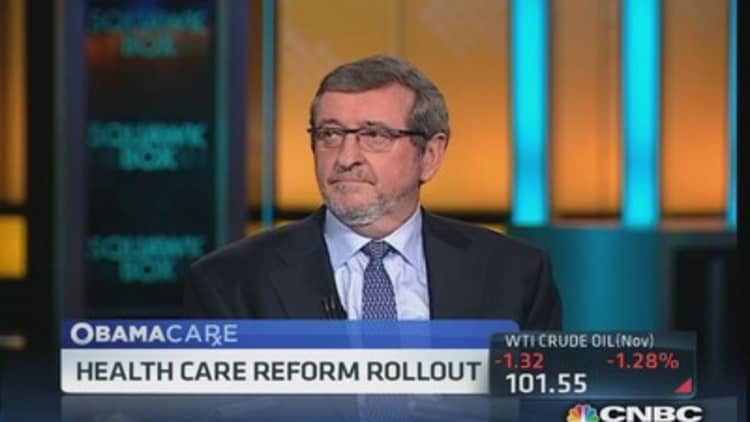
The Obamacare provision mandating that individuals buy health coverage should be allowed to go into effect as planned, says the president and CEO of North Shore-LIJ Health System, which includes a network of hospitals and now a health insurance arm.
Just don't expect everything to be perfect on Day 1.
"I don't think the preparation was as comprehensive as it should have been. There have been many, many problems," North Shore-LIJ's Michael Dowling said in a "Squawk Box" interview Monday. "Even if it works tomorrow as well as the proponents would like it to work, there will be things that don't go correctly."
On Tuesday, consumers are allowed to begin buying health insurance from state exchanges (also referred to as marketplaces) for coverage effective Jan. 1. Most individuals are required to carry insurance under President Barack Obama's 2010 Affordable Care Act or face fines.
Despite trepidation about the comprehensiveness of the preparations for the exchanges, "if you don't start, then you really won't know whether or not these things will occur the way you'd want them to occur," Dowling said.
"There will be modifications as this goes along," he added. "So I think having it start is not a bad thing."
(Read more: The selling of Obamacare: Reaching the uninsured)
Health insurance from North Shore-LIJ will be included in the New York state marketplace. "The reason we went into the exchanges, and the reason we started our own insurance entity is because I wanted to get into the business of promoting health and not just being in the business of treating illness," Dowling said. "I'm not only getting paid to take care of you when you get sick."
Opponents have said the exchanges are not ready yet, and that's at the heart of the latest effort by GOP leaders on Capitol Hill to thwart Obamacare.
(Read more: DC 'shenanigans' may cap stock gains, says Bob Doll)
Over the weekend, House Republicans pushed through a one-year delay of the individual mandate as part a temporary spending bill to fund federal government operations beyond midnight. The Democrat-controlled Senate has said that's a nonstarter. So barring a last minute agreement, a partial shutdown of the government could happen for the first time in 17 years on Tuesday morning.
(Read more: Will 11th hour billkeep the lights on temporarily?)
In early July, the White House and the Treasury Department announced a one-year delay in a major provision that would have required employers with at least 50 full-time workers to provide health insurance or pay a penalty. That will now go into effect in 2015.
"Parts of the reform act and parts of the exchange piece have already been delayed. But this is what happens when you have a major, major, major effort," Dowling said.
"Consumerism is an important aspect of all of this," he stressed. "I think it's important that the public gets the opportunity to get information, see information is transparent, make decisions, have some skin in the game, because you know people are going to be paying money out of pocket."
But he acknowledged that getting people to sign up—even under the threat of fines—may be difficult. "It's going to take about 45 minutes to sign up. You got to fill out a whole attestation form, an eligibility form, you have to give all your demographic information."
"The question we don't know is how will people's behavior ... change?" he asked. "We don't know what the healthy 27-, 28-, 29-year-old will do. Only time will tell."
(Read more: Most Americans against defunding Obamacare, CNBC survey)
Dowling noted that health insurance reform efforts were underway long before Obamacare. "It's not like nothing was happening, and all of a sudden the act passed and all new things began to happen. There have been reform efforts going on for the past 10 years."
"There's no perfect solution here. Every solution moves you down the road a little bit. Then you modify it. Then you change it," he concluded. "My belief is that you won't know for sure what is exactly going to happen for a number of years. And by then, the legislation will have been modified if the people in Congress can ever get their act together to do anything."
—By CNBC's Matthew J. Belvedere. Follow him on Twitter @Matt_SquawkCNBC.


